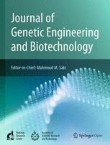Ver ítem
- xmlui.general.dspace_homeCentros Regionales y EEAsCentro Regional Tucumán - Santiago del EsteroEEA FamailláArtículos científicosxmlui.ArtifactBrowser.ItemViewer.trail
- Inicio
- Centros Regionales y EEAs
- Centro Regional Tucumán - Santiago del Estero
- EEA Famaillá
- Artículos científicos
- Ver ítem
Optimized somatic embryogenesis and plant regeneration in elite Argentinian sugarcane (Saccharum spp.) cultivars
Resumen
Background: Biotechnological breeding of elite sugarcane cultivars is currently limited because of the difficulty of regenerating plants by tissue culture. Here, we report that commercially elite sugarcane genotypes, which are adapted to Argentinian agro-ecological conditions, are capable of being regenerated via indirect somatic embryogenesis. Leaf rolls of five elite genotypes were cultured following two callus induction protocols using different
[ver mas...]
Background: Biotechnological breeding of elite sugarcane cultivars is currently limited because of the difficulty of regenerating plants by tissue culture. Here, we report that commercially elite sugarcane genotypes, which are adapted to Argentinian agro-ecological conditions, are capable of being regenerated via indirect somatic embryogenesis. Leaf rolls of five elite genotypes were cultured following two callus induction protocols using different concentrations of 2,4-D as the growth regulator. Embryogenic calluses were regenerated under light conditions. Regenerated plants were subsequently acclimatized in the greenhouse under two acclimatization procedures before being transplanted to the field.
Results: Four of the five genotypes were able to form somatic embryos following the two induction protocols. The variables related to embryogenic callus production were influenced by the interaction between genotype and culture conditions. For plant regeneration, the embryogenic calluses were further cultured on an IBA-supplemented medium, where we observed a high genotype dependence. Calluses from the four cultivars regenerated a good number of plants. With the procedures described here, we obtained more than 90% of well-acclimatized plants both in the greenhouse and in the field.
Conclusions: This protocol provides a simple way to regenerate sugarcane plants through indirect somatic embryogenesis. Also, the results confirm that tissue culture ability is highly genotype-dependent in sugarcane. Our findings suggest that these elite cultivars could be good candidates for biotechnological breeding.
[Cerrar]

Fuente
Journal of Genetic Engineering and Biotechnology 19 : Article number: 171 (2021)
Fecha
2021-11
Editorial
Springer
ISSN
1687-157X
2090-5920
2090-5920
Documentos Relacionados
Formato
pdf
Tipo de documento
artículo
Proyectos
(ver más)
INTA/PNIND-1108063/AR./Desarrollo y aplicación de nuevas herramientas tecnológicas para caracterización y generación de materiales genéticos
INTA/PNBIO-1131024/AR./Desarrollo de sistemas alternativos de generación y utilización de variabilidad genética y su aplicación al mejoramiento de los cultivos.
Palabras Claves
Derechos de acceso
Abierto
 Excepto donde se diga explicitamente, este item se publica bajo la siguiente descripción: Creative Commons Attribution-NonCommercial-ShareAlike 2.5 Unported (CC BY-NC-SA 2.5)
Excepto donde se diga explicitamente, este item se publica bajo la siguiente descripción: Creative Commons Attribution-NonCommercial-ShareAlike 2.5 Unported (CC BY-NC-SA 2.5)


